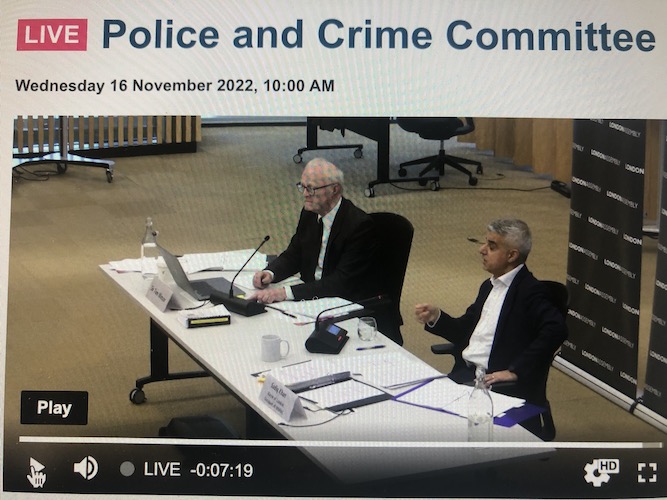When Metropolitan Police commissioner Dame Cressida Dick announced her resignation back in February there weren’t too many people bemoaning that decision. After all, Londoners’ trust and confidence in their police force was heading towards an all-time low.
Home Secretary Priti Patel nevertheless agreed to a request from Dame Cressida’s deputy, Sir Stephen House, for a review of the circumstances of her leaving, appointing Sir Tom Winsor, than about to retire after a decade as chief inspector of constabulary, to the task.
Over 115 pages, Winsor didn’t hold back, concluding that Mayor Khan had breached “due process” and intimidated the Commissioner into resigning – prompting the Mayor to accuse him of being “clearly biased” and ignoring the facts of the case.
The views of neither party had softened when they found themselves only an uncomfortable metre or so apart yesterday at the London Assembly’s police and crime committee, where Khan had been officially “summonsed” to face questioning about his role in Dame Cressida’s departure.
Cue some tense exchanges, with the Mayor suggesting a “close association” between Winsor and the commissioner and a tendency on Winsor’s part to give more weight to police evidence than to that provided to him by City Hall. “Absurd,” Winsor said.
Khan and his staff had “failed to engage properly” with the investigation until a very late stage, offering only one 90-minute meeting, compared to five hours with the former Commissioner, Winsor said. “We fully cooperated,” Khan replied, adding that “copious” documentation had been provided.
Amid claim and counter-claim, with Khan reminding Winsor that he had previously described Dick as “one of the most talented and far-sighted police officers the police have had in living memory” and Winsor accusing Khan of “abuse of power”, the pair were essentially speaking different languages.
For Khan, it had been a question of a mounting series of “terrible scandals”, with Operation Hotton uncovering bullying, discrimination, racism, misogyny and improper conduct at Charing Cross police station the “straw that broke the camel’s back”.
With trust and confidence in the Met at “rock bottom”, Khan urgently wanted a new plan. But what the then Commissioner came up with was “simply not good enough given the scale of the challenges facing our police service,” he said.
That had been on 4 February this year. At that point, Khan said, “it was still possible for the Commissioner to persuade me that she could address these issues and win back trust and confidence.” So a further meeting was fixed for 10 February.
“That was an opportunity to find a way forward, as we had done on many occasions in the past,” Khan said. “But she didn’t bother to turn up and didn’t build on the plan she had sent me. I don’t understand, even to this day, why Dame Cressida didn’t come to the meeting.” The Commissioner’s resignation came instead.
But for Winsor, Dick had effectively been subject to what he called in his report a “classic case of constructive dismissal”. It was an “abuse of power, a political ambush, oppressive and unreasonable conduct,” he told Assembly members.
Undue pressure had been applied for the Commissioner to take further action against officers at Charing Cross even though the Independent Office for Police Conduct had already determined the cases, and City Hall had failed to engage with Dame Cressida’s proposed 4 February action plan until too late, while Khan was publicly putting her “on notice” over his concerns.
Crucially, for Winsor, the Mayor failed to follow the statutory processes laid down in the Police Reform Act 2011 to deal with possible dismissal of a chief constable, including written notice, hearings and referrals to the chief inspector of constabulary and the home secretary.
That was simply because the process had not been invoked, said Khan. “That didn’t happen because the Commissioner didn’t come to that meeting and she decided to resign.”
Political ambush, or simply the nature of political decision-making in the face of serious concerns? And any political gain there may have been for the government in attacking Khan over a decision many agreed with seemed to dilute rapidly.
Even as she announced the publication of the report in September, Patel sounded happy to move on. “I hope now that those responsible for delivering policing in London – as well as those responsible for holding the Met to account – will concentrate their efforts on delivering safer streets for the capital and restoring integrity in policing,” she said. “Public confidence in the Met has been dented by a series of appalling incidents and it is vital that failings are addressed and professional standards restored to the level that Londoners deserve.”
While the committee did decide to pursue the matter, agreeing to requisition various documents for further consideration, it seems that the Met, under its new leadership, and – crucially – Londoners have moved on too.
The full meeting can be viewed here.
On London strives to provide more of the kind of journalism the capital city needs. Become a supporter for just £5 a month. You will even get things for your money, including invitations to events such as the one reported above. Details here.

